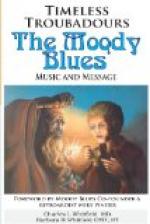CHAPTER IX [127]
PROVENCAL INFLUENCE IN GERMANY, FRANCE AND ENGLAND
Provencal influence in Germany is apparent in the lyric poetry of the minnesingers. Of these, two schools existed, connected geographically with two great rivers. The earlier, the Austro-Bavarian school, flourished in the valley of the Danube: the later minnesingers form the Rhine school. In the latter case, Provencal influence is not disputed; but the question whether the Austro-Bavarian school was exempt from it, has given rise to considerable discussion. The truth seems to be, that the earliest existing texts representing this school do show traces of Provencal influence; but there was certainly a primitive native poetry in these Danube districts which had reached an advanced stage of development before Provencal influence affected it. Austria undoubtedly came into touch with this influence at an early date. The Danube valley was a high road for the armies of crusaders; another route led from Northern Italy to Vienna, by which Peire Vidal probably found his way to Hungary. At the same time, though Provencal influence was strong, the [128] Middle High German lyric rarely relapsed into mere imitation or translation of troubadour productions. Dietmar von Aist, one of the earliest minnesingers, who flourished in the latter half of the twelfth century has, for instance, the Provencal alba theme. Two lovers part at daybreak, when awakened by a bird on the linden: if the theme is Provencal, the simplicity of the poet’s treatment is extremely fresh and natural. This difference is further apparent in the attitude of minnesingers and troubadours towards the conception of “love.” The minnesong is the literary expression of the social convention known as “Frauendienst,” the term “minne” connoting the code which prescribed the nature of the relation existing between the lover and his lady; the dominant principle was a reverence for womanhood as such, and in this respect the German minnesang is inspired by a less selfish spirit than the Provencal troubadour poetry. Typical of the difference is Walter von der Vogelweide’s—
Swer guotes wibes minne hat,
der schamt sich aller missetat.
("He who has a good woman’s love is ashamed of every ill deed"), compared with Bernart de Ventadour’s—
Non es meravilha s’ieu chan
[129]
Melhs de nul autre chantador
Car plus trai mos cors ves Amor
E melhs sui faitz a son coman.




